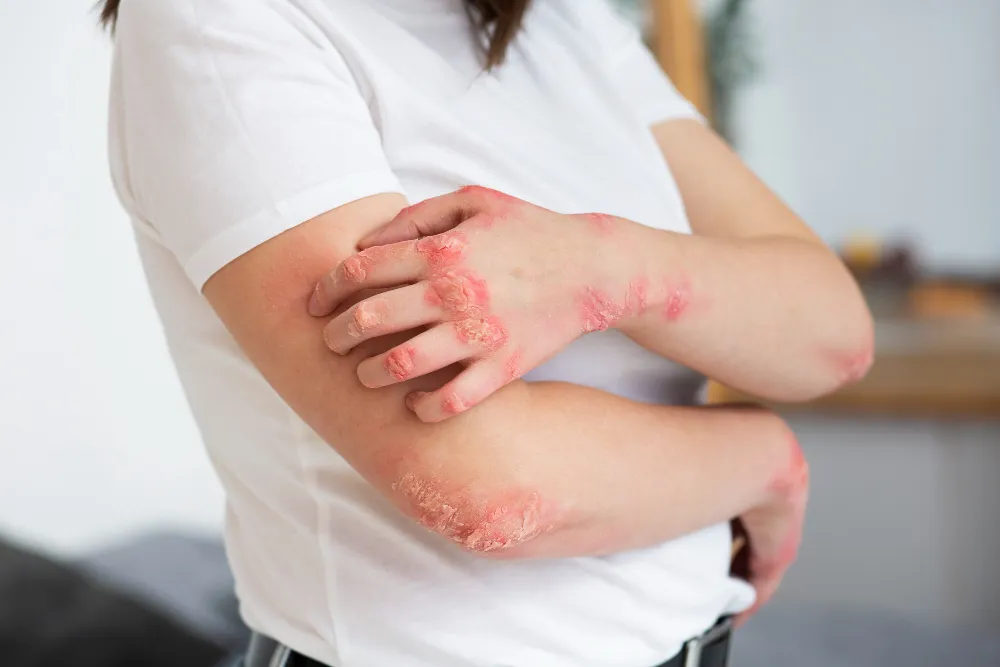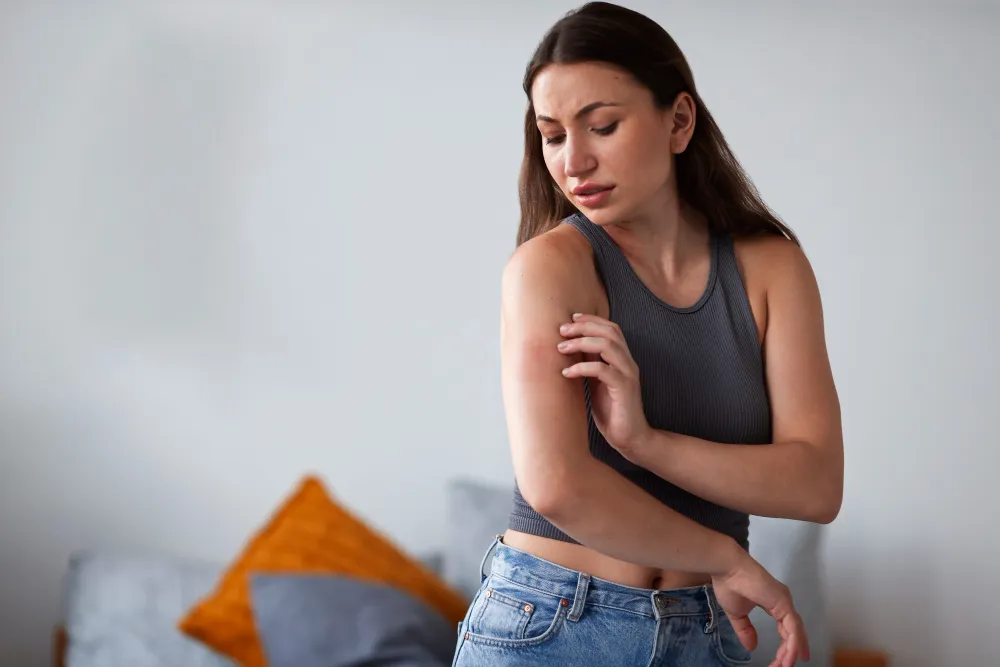
Eczema is a skin condition that can disrupt daily life, causing irritation, redness, dryness, and severe itching. While many people rely on conventional treatments for relief, Ayurvedic treatments for eczema offer a holistic and natural approach that goes beyond symptom management. Ayurveda, an ancient system of medicine, seeks to restore balance within the body, allowing it to heal naturally. This article explores the benefits and methods of Ayurvedic Treatments for eczema, helping you understand how it can support your skin’s health and well-being.
What is Eczema?

Eczema, or atopic dermatitis, is a chronic condition that causes skin inflammation, resulting in dryness, redness, and intense itching. It can appear on different parts of the body and can worsen during specific triggers. The skin may also become cracked or blistered in more severe cases.
Common Symptoms of Eczema
- Redness and Swelling: A hallmark sign of eczema is inflamed, red skin, which may be sensitive to the touch.
- Dryness and Flakiness: Affected areas often experience extreme dryness and rough patches of skin.
- Intense Itching: Persistent itching is one of the most bothersome symptoms, often worse at night.
- Blisters and Oozing: In severe cases, fluid-filled blisters can appear, which eventually crust over.
Possible Causes of Eczema
While the exact cause of eczema is unclear, several factors contribute to its development:
- Genetic Factors: A family history of eczema, asthma, or allergies increases the likelihood of developing the condition.
- Environmental Triggers: Pollution, dust, pet dander, and allergens like pollen can worsen eczema flare-ups.
- Skin Irritants: Harsh soaps, chemicals, and fragrances can exacerbate symptoms.
- Stress: Emotional stress can trigger or worsen eczema, affecting the body’s immune response.
The Ayurvedic Approach to Eczema
Ayurveda views eczema as a reflection of internal imbalances that manifest externally on the skin. According to this traditional system of medicine, the three doshas—Vata, Pitta, and Kapha—are responsible for different types of skin conditions. An imbalance in any of these doshas can lead to eczema flare-ups. Ayurvedic treatments for eczema focus on restoring harmony and balance within the body to address the root cause of the condition.
The Role of Doshas in Eczema
- Vata Dosha: When imbalanced, Vata can cause dry, cracked, and flaky skin, typical of eczema’s more desiccated forms.
- Pitta Dosha: An excess of Pitta can lead to inflammation, redness, and burning sensations, common symptoms of eczema.
- Kapha Dosha: Kapha imbalance leads to excessive moisture retention and thickened skin, often contributing to oozing eczema.
By identifying which dosha is out of balance, Ayurvedic treatments for eczema can be customized to target your specific needs and help soothe the symptoms.
Key Ayurvedic Treatments for Eczema
Ayurveda offers a range of treatments designed to restore balance and heal the skin from the inside out. These treatments are both internal and external, using natural herbs, oils, and therapies to combat eczema’s symptoms.
Detoxification with Panchakarma
Panchakarma is an essential aspect of Ayurveda that helps detoxify the body by removing accumulated toxins (Ama) that may contribute to eczema flare-ups. This process enhances the body’s natural ability to heal.
- Virechana (Purgation): A cleansing process that eliminates toxins from the digestive tract, reducing inflammation caused by Pitta imbalances.
- Vamana (Therapeutic Vomiting): A detoxification technique that clears Kapha toxins, relieving excess fluid and mucus that contribute to skin irritation.
- Raktamokshana (Bloodletting): Removes toxins from the bloodstream, promoting clearer skin and reducing eczema symptoms.
Panchakarma provides a comprehensive and deep cleanse, which is an integral part of Ayurvedic treatments for eczema.
Herbal Remedies for Eczema
Herbs play a significant role in treating eczema by targeting the root cause and reducing inflammation, itching, and dryness.
Some of the most beneficial herbs for Ayurvedic treatments for eczema include:
- Neem: Known for its powerful antibacterial, antifungal, and anti-inflammatory properties, neem helps cleanse the skin and reduce infections.
- Turmeric: With its potent anti-inflammatory and antioxidant properties, turmeric soothes irritated skin and promotes healing.
- Aloe Vera: Famous for its cooling effects, aloe vera hydrates the skin, preventing dryness and irritation.
- Manjistha: A blood purifier that helps reduce internal inflammation and prevents eczema flare-ups.
- Guduchi: An herb that strengthens the immune system and detoxifies the body, promoting better skin health.
These herbs are often used in Ayurvedic treatments for eczema, either in oral supplements or topical applications.
Topical Ayurvedic Treatments for Eczema
In addition to oral remedies, Ayurvedic oils and pastes can provide immediate relief to the skin, promoting healing and reducing symptoms.
- Neem-Turmeric Paste: Combining neem and turmeric, this paste is a powerful remedy for treating infected and inflamed skin.
- Kumkumadi Taila (Medicated Oil): This oil helps reduce pigmentation, smooths rough patches, and provides deep nourishment to dry skin.
- Buttermilk Therapy (Takradhara): Soothing and cooling, buttermilk therapy helps reduce Pitta and alleviate skin irritation.
Topical treatments are especially useful in Ayurvedic treatments for eczema to address localized inflammation and itching.
Dietary Modifications for Eczema Management
Diet plays a significant role in balancing doshas and healing the body. Ayurveda recommends specific foods and drinks to support skin health and reduce eczema flare-ups.
Foods to Include:
- Cooling Foods: Coconut, cucumbers, and melons help cool the body and reduce inflammation.
- Fruits and Vegetables: Pomegranate, apples, and leafy greens support detoxification and enhance skin healing.
- Digestive Spices: Fennel, coriander, and cumin aid in digestion, which is key to maintaining balance in the body.
Foods to Avoid:
- Spicy Foods: Foods high in spice can increase Pitta and worsen eczema symptoms.
- Dairy Products: Dairy can aggravate Kapha dosha and contribute to skin congestion.
- Processed Foods: Excess sugar and refined flour can lead to inflammation, affecting both the skin and overall health.
Adopting a diet in line with Ayurvedic treatments for eczema can help manage and prevent flare-ups.
Lifestyle Adjustments for Eczema Relief
Incorporating lifestyle changes that align with Ayurvedic principles can significantly enhance the effectiveness of eczema treatment.
- Reduce Stress: Practices such as yoga, meditation, and pranayama can help lower stress, which is often a trigger for eczema flare-ups.
- Proper Skin Care: Avoid hot showers, and use natural, gentle skin care products. Moisturize regularly to prevent dryness.
- Sleep Routine: Ensure adequate, restful sleep to promote healing and rejuvenation.
By following Ayurvedic lifestyle recommendations, you can prevent future flare-ups and achieve long-term relief from eczema.
10 Benefits of Ayurvedic Treatments for Eczema
Let’s explore the 10 Benefits of Ayurvedic Treatments for Eczema:
- Natural Healing: Uses chemical-free, plant-based treatments to soothe and restore the skin.
- Holistic Approach: Addresses the root cause of eczema, promoting overall health and well-being.
- Long-Term Relief: Prevents recurrence by focusing on balance and immunity.
- Personalized Treatments: Customizes treatments based on dosha imbalances for more effective healing.
- Detoxification: Removes harmful toxins from the body, reducing inflammation and skin irritation.
- Anti-Inflammatory Properties: Reduces redness, swelling, and itching associated with eczema.
- Improved Skin Hydration: Herbs and oils hydrate dry, cracked skin, preventing further damage.
- Restored Skin Barrier: Strengthens the skin’s natural barrier to protect against environmental triggers.
- Boosted Immunity: Supports the immune system, reducing sensitivity to allergens and irritants.
- Mental and Emotional Balance: Promotes mental clarity and reduces stress, improving emotional well-being.
Conclusion
Ayurvedic treatments for eczema offer a natural, holistic, and personalized approach to managing and healing eczema. By addressing both the external symptoms and internal imbalances, Ayurveda provides lasting relief that restores skin health from the inside out. Whether it’s through detoxification, herbal remedies, or lifestyle changes, Ayurveda offers a comprehensive strategy for eczema sufferers looking for a more natural solution.
FAQs
1. How long does it take to see results from Ayurvedic treatments for eczema?
Results vary, but many people notice improvements within 4 to 6 weeks of following Ayurvedic treatments consistently.
2. Can Ayurvedic treatments for eczema be used alongside conventional medicine?
Yes, Ayurveda can complement conventional treatments, but it’s essential to consult with a healthcare professional before combining the two.
3. Are Ayurvedic treatments for eczema suitable for all ages?
Yes, Ayurvedic treatments are gentle and safe for people of all ages, including children.
4. Can Ayurvedic treatments for eczema help with eczema on sensitive areas, like the face?
Absolutely! Ayurvedic oils and herbal remedies can be applied to sensitive areas, ensuring gentle care.
5. Is diet essential when using Ayurvedic treatments for eczema?
Yes, diet plays a crucial role in managing eczema and enhancing the effectiveness of Ayurvedic treatments.




